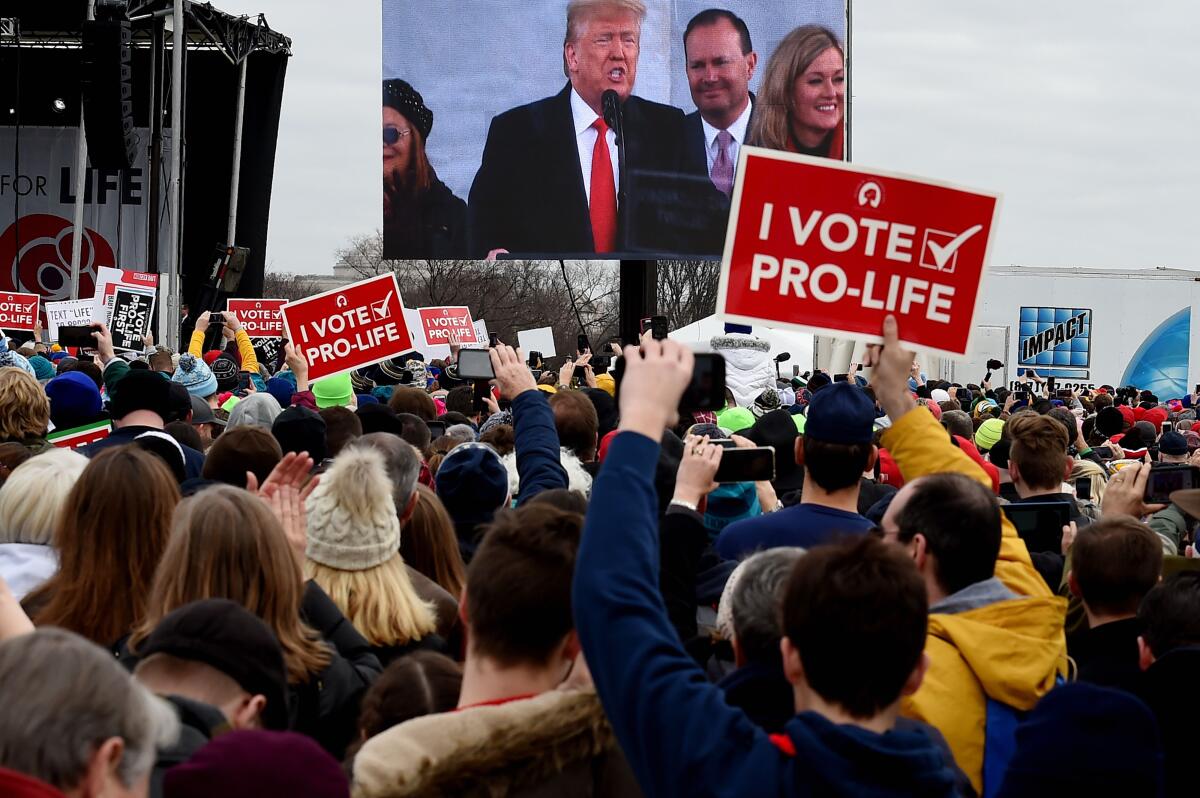Opinion: Texas wants its citizens to enforce a new abortion ban, and we should all be concerned

In Texas, a dangerous future looms on the horizon for anyone who values privacy or individual autonomy. Come September, ordinary citizens could be granted the power to monitor and sue their neighbors for violating a new abortion law.
This spring the Texas Legislature passed Senate Bill 8, which prohibits abortion after the detection of a fetal heartbeat, typically around six weeks into pregnancy. An abortion ban that early is completely unconstitutional; Roe vs. Wade and Casey vs. Planned Parenthood established that a woman has the right to an abortion any time prior to fetal viability, which is around 24 weeks of pregnancy.
Women are often not even aware they’re pregnant during the first six weeks. But the most chilling aspect of Texas’ new ban isn’t the flagrant attack on reproductive rights, it’s the legal innovation that might just let state lawmakers get away with it.
SB 8 authorizes only private citizens, not the government, to file suit to enforce the law. Any individual who objects to an abortion performed later than six weeks into a pregnancy — it could be the woman’s ex-boyfriend, barista, co-worker — can sue any party involved other than the woman herself, whom the law immunizes.
In case Texans aren’t motivated to go to court, there’s also a $10,000 reward for anyone who wins one of these lawsuits, effectively putting a litigation bounty on the head of abortion providers.
There’s plenty of precedent for giving individuals the right to sue to enforce a state or federal law — witness California labor law or most federal environmental statutes. What’s different here is that citizens aren’t joining government officials in enforcing SB 8, they’re being put in the government’s place.
The law was designed this way to make it harder to overturn. “They’re basically trying to get around federal court review,” said Marc Hearron, senior counsel for the Center for Reproductive Rights. “They know this is a blatantly unconstitutional law, and they know that if they had gone the same route as all of the other states, they would have had no chance of success.”
Abortion bans have been shut down in other states before they took effect, but this one could be harder to block. Stephen Vladeck, a professor at the University of Texas Austin School of Law, said private enforcement offers a loophole. “This makes it really hard for those who are affected by this law to challenge it,” he said, “because it’s not clear who you sue when you’re protesting a law that the government is not responsible for enforcing.”
Despite this hurdle, a group of abortion providers, counselors and others including the Center for Reproductive Rights filed a federal lawsuit targeting the Texas law this week. The defendants in the case include every state court judge and country clerk in Texas, the Texas Medical Board, the state attorney general and the director of Right to Life of East Texas.
The plaintiffs are asking the court to block the law before it takes effect Sept. 1. If they’re not successful, SB 8 is likely to have disastrous consequences for the availability of abortion in Texas.
“This is going to severely limit people’s ability to access abortions even before six weeks, because it will isolate patients,” said Julia Kaye, an ACLU lawyer seeking to block the law. The ban would cut abortion patients off from their support networks and encourage an anti-abortion public crusade, Kaye said.
By encouraging citizens to enforce the ban, Texas has equated abortion regulation to a public and moral duty. Anybody has the right to oppose abortion, but when those individuals form an army of courthouse vigilantes backed by the state, it becomes an unreasonable imposition of their personal beliefs onto others around them. Texas isn’t just deputizing its citizens, it’s weaponizing them in the fight to eliminate abortion access in the state for good.
This would be especially detrimental for Texas’ lower-income communities, Kaye said. In particular, individuals from rural communities and communities of color are less able to travel out of state for an abortion and less likely to get quality prenatal care, she said.
Even if the ban is tossed out before September, we can’t ignore the disturbing implications that Texas’ actions have for reproductive rights and the sanctity of constitutional law.
Anti-abortion activists have been manipulating the legal system for decades. They know they’re up against the precedent set in Roe and will do whatever they can to get around it. UC Berkeley School of Law professor Khiara Bridges refers to this mind-set as “abortion exceptionalism,” the conviction that, for whatever reason, abortion is a less valid constitutional right than all the others.
The larger danger is that if the anti-abortion movement manages to create a new legal strategy to undermine that right, that strategy can carry over into other areas of federal law. “The anti-choice forces out there are incredibly creative,” Bridges said. “But this is bigger than abortion. This is a terrifying precedent to set for any person who cares about constitutional rights.”
If Texas successfully insulates SB 8 from judicial challenge by employing the private enforcement approach, then other states can follow that roadmap to target any federal rights they oppose. Imagine restrictions on free speech or religion that can’t be blocked in court because they’re enforced not by the government, but by ordinary people.
“If it’s a red state abortion ban today, tomorrow it will be a blue state gun ban. This ought not to be partisan,” said the University of Texas’ Vladeck.
The Texas Legislature may or may not be aware of the dangerous vehicle they’ve created in their desperation to ban abortions. But SB 8 is utterly unconstitutional and fundamentally threatening to our legal system and federal rights. It should be struck down without question, and never attempted again.
More to Read
A cure for the common opinion
Get thought-provoking perspectives with our weekly newsletter.
You may occasionally receive promotional content from the Los Angeles Times.











